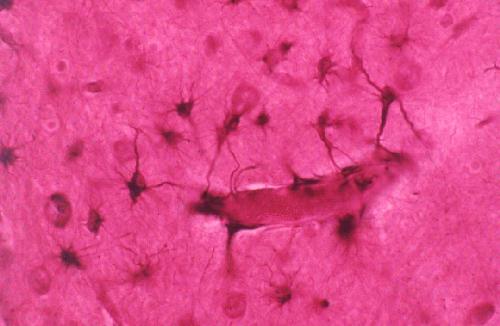|
|
|||||||||
 |
This picture illustrates the the relationship between astrocytes and blood vessels. The dark 'star-like' figures are the astrocytes. |
Astrocytes are star shaped glial cells that perform a variety of functions in the CNS. Astrocytes provide physical support to neurons and clean up debris within the brain. They also provide neurons with some of the chemicals needed for proper functioning and help control the chemical composition of fluid surrounding neurons. Finally, astrocytes play a role in providing nourishment to neurons. In order to provide physical support for neurons astrocytes form a matrix that keep neurons in place. In addition, this matrix serves to isolate synapses. This limits the dispersion of transmitter substances released by terminal buttons; thus aiding in the smooth transmission of neural messages. Astrocytes also perform a process known as phagocytosis. Phagocytosis occurs when an astrocyte contacts a piece of neural debris with its processes (arm of the astrocyte) and then pushes itself against the debris eventually engulfing and digesting it. Astrocytes provide nourishment to neurons by 1) receiving glucose from capillaries 2) breaking the glucose down into lactate (the chemical produced during the first step of glucose metabolism) 3) releasing the lactate into the extra cellular fluid surrounding the neurons. The neurons receive the lactate from the extra cellular fluid and transport it to their mitochondria to use it for energy. In this process astrocytes store a small amount of glycogen, which stays on reserve for times when the metabolic rate of neurons in the area is especially high. |
| [Glial Cells] [Astrocytes] [Oligodendrocytes] [Microglia] [Schwann Cells] |